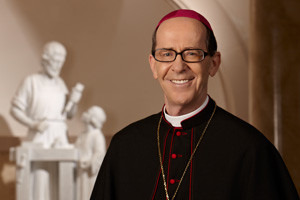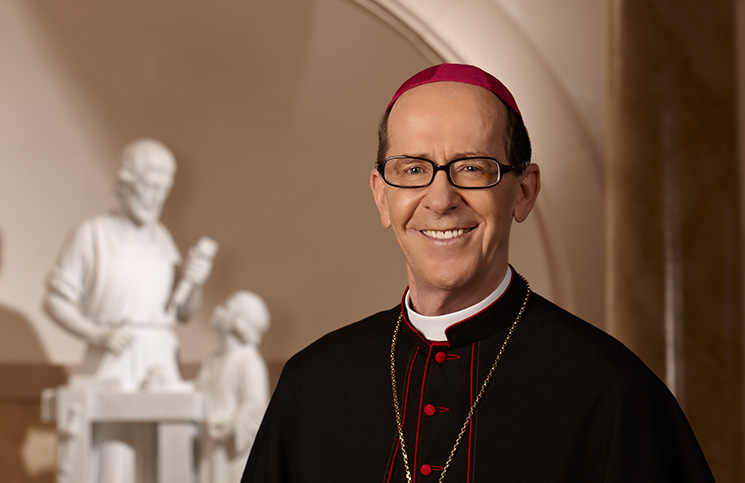In the previous parts of this series, we have looked at the Americanization of the Church in our country, how the popular culture has impacted the Church, especially during the past half century, and at the complex relationship between faith and culture. The vast field of evangelization in America has both disturbing trends and grace-filled ones. In the face of both, we have the duty and privilege of knowing, loving and serving Jesus Christ.

To remain faithful to our mission from the Lord to evangelize, we need to begin by seriously discerning the forces at work within popular culture that hinder the mission of believers, and that limit the opportunities for success in bearing witness to Christ in America in the 21st century.
The Catholic standard of assessment
What must be resisted, without a doubt, are two common temptations: firstly, to blame the culture for all the problems among the members of the Church, when in fact our own sins are at times the primary reason for them; and secondly, to uncritically accommodate the popular culture without taking into account what is incompatible with our faith and thus requires our opposition.
The Catholic standard for discerning the viability and wisdom of when to assimilate to a culture, or when to resist assimilation, must be the Gospel of Jesus as handed down to us within the Church, and as celebrated in the Sacred Liturgy. In this regard, it is good to recall what Pope Francis said in his first homily as the Successor of Peter: “When we journey without the Cross, when we build without the Cross, when we profess without the Cross, we are not disciples of the Lord; we are worldly… We may become a charitable NGO, but not the Church, the Bride of the Lord… When we do not profess Jesus Christ, we profess the worldliness of the devil.”
There are some elements in American culture that aid our faithful living of the Gospel and some elements that make doing so more difficult. Likewise, there are still other elements that can have either a positive or a negative impact in carrying out our mission from God. For example, individualism can positively help us to recognize the dignity of each human person, but it also can erode appreciation for the social nature of human beings, the communal nature of our faith, and the call to live in a communion of life and love with all members of Christ’s Body, the Church.
‘What are we not to do?’
After Peter preached in Jerusalem at Pentecost, his listeners, touched to the heart by his words and moved by the Holy Spirit, asked with a sense of urgency (Acts 2:37), “What are we to do?” Perhaps in every age of the Church and in every culture in which she becomes incarnate, this question needs to be asked, for she faces ever new challenges that need to be resisted in order, at this time in history, to bear witness to Christ.
It is also helpful to ask, “What are we not to do?” We can learn from the past what has not worked, even if initially tried with good intentions. For example, we cannot let anything become more important than Jesus and His Gospel, including patriotic devotion to our country. A case in point, from which to learn, is the public stance of John F. Kennedy as reflected in comments he made during his campaign for the White House in AD 1960.
While many Catholics understandably took pride in the election of the first Catholic president of the United States, not all that he proposed deserves our emulation. It is good, 50 years later, to re-evaluate the impact of his words and actions on the role of faith in American life.
In AD 1959, John Kennedy said, in an interview with LOOK magazine, that for an “officeholder, no moral obligation transcends the duty to live up to the Constitution.” But what happens when the Constitution, without any basis in preceding jurisprudence or the document itself, is interpreted by seven justices of the Supreme Court to mean that unborn children have no right to life? What happens when government actions and policies directly contradict principles of natural law, religious liberty and the Gospel of Christ?
As Russell Shaw aptly points out in “American Church: The Remarkable Rise, Meteoric Fall, and Uncertain Future of Catholicism in America” (p. 142), “…pro-choice Catholics can trace the intellectual roots of their position on abortion to JFK.” Shaw also notes with respect to these Catholic dissenters how “Many are actively involved in the campaign by secularists in and out of government to coerce church-sponsored enterprises like schools, hospitals and Catholic Charities to adopt secularist values in relations to issues like contraception, abortion, and same-sex marriage or else go out of business.”
This is precisely what Catholics are not to do. It betrays their God given duty to protect the life and dignity of the most vulnerable in society; it contradicts their duty as human beings to other persons. It is a stumbling block to responsible stewardship in society.
Do not stand by idly
A culture of pleasure breeds indifferentism. As persons “go with the flow,” not only do their hearts become impure but their souls become morally lazy, and they slide into spiritual inertia. While one is tempted to blame such indifference on the secularistic culture, it is actually due to a sickness of heart that has turned in on itself, a heart that has become distracted by the things of creation and stopped listening to the Creator Himself.
Indifference arises from deafness to God’s voice, from preoccupation with things other than God. Recall what Jesus said to the crowds who were idle and yet exhausted in spirit. He told them (Mt 9:37-38), “The harvest is abundant but the laborers are few, so ask the master of the harvest to send out laborers for his harvest.” To overcome spiritual lethargy, ask the Lord for laborers, that is, for men and women — no matter their state in life — who are eager to work wherever God calls them, for as long as He calls them, in the work to which God calls them. Indifference is conquered when we are ready to say with Jesus (Jn 6:38), “I came…not to do my own will but the will of the one who sent me.”
No one is left out of God’s call to work in His Kingdom. In the Parable that Jesus tells about the Workers in the Vineyard, (Mt 10:1-16), the owner goes out no less than five times-in one day-in search of workers for his vineyard. The “owner of the vineyard,” who represents God, manifests an untiring passion for finding workers for his vineyard. He wants no one to be left “standing idly by” but all to hear and heed his call to work in his vineyard. The message of the parable is clear: If anyone does not work in the vineyard, it is not because God failed to call them. Some “thing” is hindering their response, some attitude within their own souls. A culture of consumerism and pleasure can do that. But there is a sure way to freedom: if you ever feel caught in this secularist culture tell God what Isaiah told Him (Is 6:8), “Here I am, Lord. Send me.”
Next time, we shall consider some of the other things Catholics in America can do in order effectively to bear witness to Christ at this point in our nation’s history.






![[VIDEO] Make Sunday feel like Sunday again](https://www.catholicsun.org/wp-content/uploads/2021/04/2021-YOUTUBE-BISHOP-MESSAGE-THUMBNAIL-ENGLISH-218x150.png)
